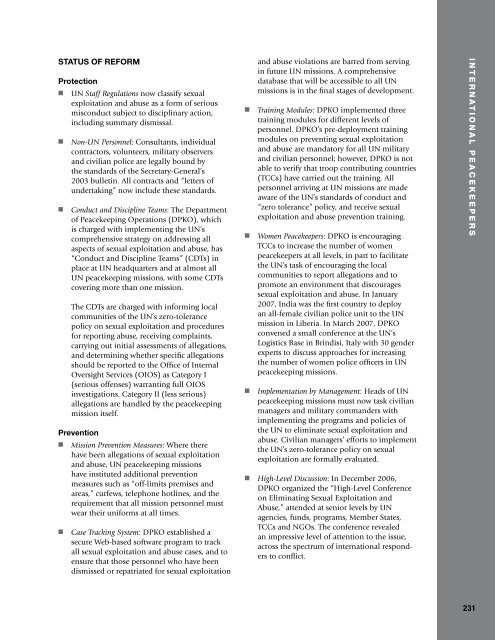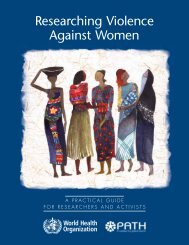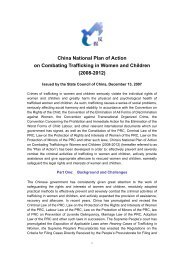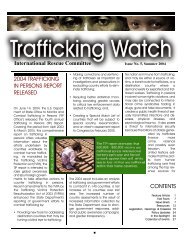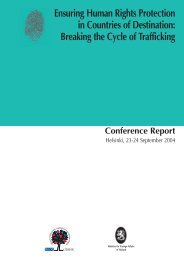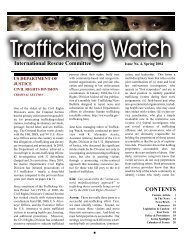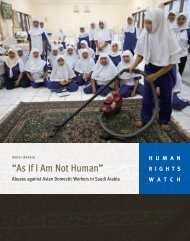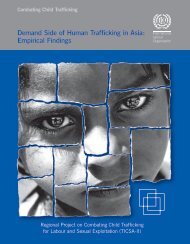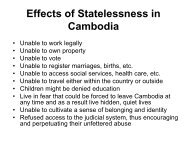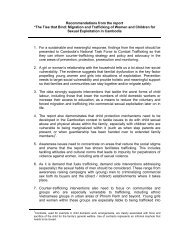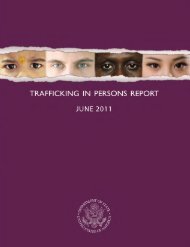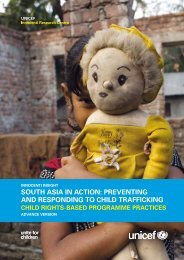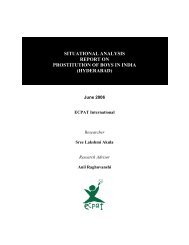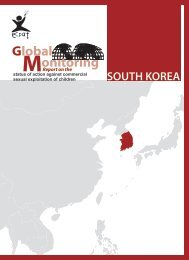2007 Trafficking in Persons Report - Center for Women Policy Studies
2007 Trafficking in Persons Report - Center for Women Policy Studies
2007 Trafficking in Persons Report - Center for Women Policy Studies
You also want an ePaper? Increase the reach of your titles
YUMPU automatically turns print PDFs into web optimized ePapers that Google loves.
STATUS OF REFORM<br />
Protection<br />
n<br />
n<br />
n<br />
UN Staff Regulations now classify sexual<br />
exploitation and abuse as a <strong>for</strong>m of serious<br />
misconduct subject to discipl<strong>in</strong>ary action,<br />
<strong>in</strong>clud<strong>in</strong>g summary dismissal.<br />
Non-UN Personnel: Consultants, <strong>in</strong>dividual<br />
contractors, volunteers, military observers<br />
and civilian police are legally bound by<br />
the standards of the Secretary-General’s<br />
2003 bullet<strong>in</strong>. All contracts and “letters of<br />
undertak<strong>in</strong>g” now <strong>in</strong>clude these standards.<br />
Conduct and Discipl<strong>in</strong>e Teams: The Department<br />
of Peacekeep<strong>in</strong>g Operations (DPKO), which<br />
is charged with implement<strong>in</strong>g the UN’s<br />
comprehensive strategy on address<strong>in</strong>g all<br />
aspects of sexual exploitation and abuse, has<br />
“Conduct and Discipl<strong>in</strong>e Teams” (CDTs) <strong>in</strong><br />
place at UN headquarters and at almost all<br />
UN peacekeep<strong>in</strong>g missions, with some CDTs<br />
cover<strong>in</strong>g more than one mission.<br />
The CDTs are charged with <strong>in</strong><strong>for</strong>m<strong>in</strong>g local<br />
communities of the UN’s zero-tolerance<br />
policy on sexual exploitation and procedures<br />
<strong>for</strong> report<strong>in</strong>g abuse, receiv<strong>in</strong>g compla<strong>in</strong>ts,<br />
carry<strong>in</strong>g out <strong>in</strong>itial assessments of allegations,<br />
and determ<strong>in</strong><strong>in</strong>g whether specific allegations<br />
should be reported to the Office of Internal<br />
Oversight Services (OIOS) as Category I<br />
(serious offenses) warrant<strong>in</strong>g full OIOS<br />
<strong>in</strong>vestigations. Category II (less serious)<br />
allegations are handled by the peacekeep<strong>in</strong>g<br />
mission itself.<br />
Prevention<br />
n<br />
n<br />
Mission Prevention Measures: Where there<br />
have been allegations of sexual exploitation<br />
and abuse, UN peacekeep<strong>in</strong>g missions<br />
have <strong>in</strong>stituted additional prevention<br />
measures such as “off-limits premises and<br />
areas,” curfews, telephone hotl<strong>in</strong>es, and the<br />
requirement that all mission personnel must<br />
wear their uni<strong>for</strong>ms at all times.<br />
Case Track<strong>in</strong>g System: DPKO established a<br />
secure Web-based software program to track<br />
all sexual exploitation and abuse cases, and to<br />
ensure that those personnel who have been<br />
dismissed or repatriated <strong>for</strong> sexual exploitation<br />
n<br />
n<br />
n<br />
and abuse violations are barred from serv<strong>in</strong>g<br />
<strong>in</strong> future UN missions. A comprehensive<br />
database that will be accessible to all UN<br />
missions is <strong>in</strong> the f<strong>in</strong>al stages of development.<br />
Tra<strong>in</strong><strong>in</strong>g Modules: DPKO implemented three<br />
tra<strong>in</strong><strong>in</strong>g modules <strong>for</strong> different levels of<br />
personnel. DPKO’s pre-deployment tra<strong>in</strong><strong>in</strong>g<br />
modules on prevent<strong>in</strong>g sexual exploitation<br />
and abuse are mandatory <strong>for</strong> all UN military<br />
and civilian personnel; however, DPKO is not<br />
able to verify that troop contribut<strong>in</strong>g countries<br />
(TCCs) have carried out the tra<strong>in</strong><strong>in</strong>g. All<br />
personnel arriv<strong>in</strong>g at UN missions are made<br />
aware of the UN’s standards of conduct and<br />
“zero tolerance” policy, and receive sexual<br />
exploitation and abuse prevention tra<strong>in</strong><strong>in</strong>g.<br />
<strong>Women</strong> Peacekeepers: DPKO is encourag<strong>in</strong>g<br />
TCCs to <strong>in</strong>crease the number of women<br />
peacekeepers at all levels, <strong>in</strong> part to facilitate<br />
the UN’s task of encourag<strong>in</strong>g the local<br />
communities to report allegations and to<br />
promote an environment that discourages<br />
sexual exploitation and abuse. In January<br />
<strong>2007</strong>, India was the first country to deploy<br />
an all-female civilian police unit to the UN<br />
mission <strong>in</strong> Liberia. In March <strong>2007</strong>, DPKO<br />
convened a small conference at the UN’s<br />
Logistics Base <strong>in</strong> Br<strong>in</strong>disi, Italy with 30 gender<br />
experts to discuss approaches <strong>for</strong> <strong>in</strong>creas<strong>in</strong>g<br />
the number of women police officers <strong>in</strong> UN<br />
peacekeep<strong>in</strong>g missions.<br />
Implementation by Management: Heads of UN<br />
peacekeep<strong>in</strong>g missions must now task civilian<br />
managers and military commanders with<br />
implement<strong>in</strong>g the programs and policies of<br />
the UN to elim<strong>in</strong>ate sexual exploitation and<br />
abuse. Civilian managers’ ef<strong>for</strong>ts to implement<br />
the UN’s zero-tolerance policy on sexual<br />
exploitation are <strong>for</strong>mally evaluated.<br />
n High-Level Discussion: In December 2006,<br />
DPKO organized the “High-Level Conference<br />
on Elim<strong>in</strong>at<strong>in</strong>g Sexual Exploitation and<br />
Abuse,” attended at senior levels by UN<br />
agencies, funds, programs, Member States,<br />
TCCs and NGOs. The conference revealed<br />
an impressive level of attention to the issue,<br />
across the spectrum of <strong>in</strong>ternational responders<br />
to conflict.<br />
I n t e r n at i o n a l P e a c e k e e p e r s<br />
231


